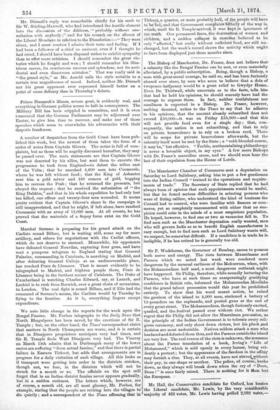We note little change in the reports for the week
upon the Bengal Famine. Mr. Forbes telegraphs to the Daily News that North Bhagulpore has been saved, by the exertions of Sir R. Temple ; but, on the other hand, the Times' correspondent states that matters in North Chumparun are worse, and it is certain that in Dinajpore proprietors anticipate very bad times, and Sir R. Temple finds West Dinajpore very bad. The Viceroy on March 14th admits that in Durbungah many of the lower castes are suffering "from actual famine," and that there is partial failure in Eastern Tirhoot, but adds that arrangements are in progress for a daily visitation of each village. All this looks as if transport were getting into order in the districts stricken, though not, we fear, in the districts which will not be struck for a month or so. The officials on the spot still forget that in an Indian district famine never appears gradually, but in a sudden outburst. The letters which, however, are of course, a month old, are all most gloomy, Mr. Forbes, for example, stating that the people are retiring into the villages to die quietly ; and a correspondent of the Times affirming that in' Tirhoot, a quarter, or more probably half, of the people will have to be fed, and that Government complains bitterly of the way in which, until Sir R. Temple arrived, it was kept in ignorance of the truth. Our permanent fears, the destruction of women and children, and a sudden collapse in counties believed to be only "affected," but really without sufficient food, are still un- changed, but the week's record shows the activity which ought to have been displayed just three months since.






































 Previous page
Previous page